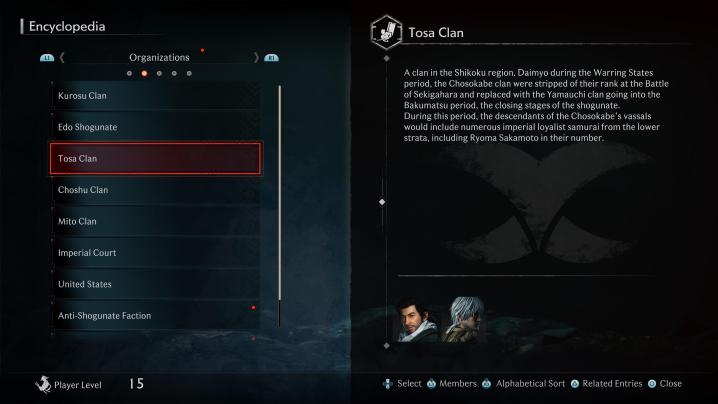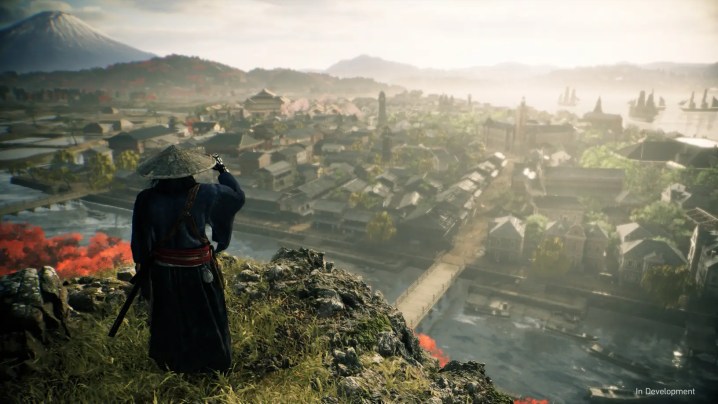
It wasn’t the combat that intimidated me most when starting Rise of the Ronin — it was the history.
Although I’ve played a couple of games set in late 19th-century Japan, I freely admit that my knowledge of the Edo period was surface-level at best. I vaguely knew of the Tokugawa shogunate and Sakamoto Ryōma, but would struggle to go into any depth on either topic if pressed. But from the opening moments of Rise of the Ronin, I recognized that this specific location and time period in which it was set would be an integral and influential force that permeated every aspect of the experience, and not just a backdrop for the story Team Ninja wanted to tell.
Getting by isn’t possible with just a passing understanding of the setting. Thankfully, Rise of the Ronin gives players the necessary tools to learn with a fantastic feature that every game could benefit from.
Context-sensitive

In Rise of the Ronin, players are free to pause the game at any moment, including during cutscenes, and be shown a list of key terms related to what is happening at that moment. From there, they can access an encyclopedia with further details on each person, faction, and their interactions. The encyclopedia is extensive and a little intimidating if you just dive into it in the menu, but it works far better if you access it in real time. During a cutscene, you can hit the DualSense controller’s touchpad and bring up a list of terms relevant to that conversation. After choosing the topic that you want, you’re then directly brought to that encyclopedia entry, where you can learn more in a concisely written paragraph.
You can go a step further by hitting Triangle to see related entries. It’s like perusing an online wiki rather than flipping through a physical encyclopedia page by page. In cutscenes, Rise of the Ronin gives players the tools to essentially wiki dive through all the information in the game and follow whatever threads interest them. Or they get a quick reminder before resuming the game and moving forward.
Rise of the Ronin isn’t the first video game to have an in-game encyclopedia. Like a Dragon: Ishin! from 2023 was the first game I played with one, although it was far more basic, only giving basic definitions for what was being talked about. Still, it was invaluable in not only immersing me in a completely foreign setting, but also helping me keep up with all the complex relationships and twists that Ryu Ga Gotoku games are known for and educating me on these people, places, and cultures I was not familiar with. Final Fantasy XVI took the concept to the next level with its dynamic Active Time Lore system, with entries evolving depending on players’ current point in the story. Ishin is a historical game, while Final Fantasy XVI takes place in a completely fictional world with lore and politics that are arguably as deep and complex as those of a setting based on reality.
Rise of the Ronin, on the other hand, mixes fact and fiction. For an outsider to both aspects, getting overwhelmed almost feels like an inevitability without a built-in tool to give the player a convenient means to build an understanding, but Rise of the Ronin circumvents that by using the best aspects of both of these prior examples. It has the depth and fluid nature of Final Fantasy XVI, but the additional educational benefits of Ishin. It kept me in lockstep with the plot, but also satiated any hunger I had to learn more about this historically pivotal moment in Japanese culture.

Team Ninja’s latest put me in charge of the pace at which I engaged with these supplemental materials. It never forced me to sit down and read a long chapter about the details of the Shogunate’s relationship with foreign powers and why it created splinter groups against it if I didn’t want to. When I did want to, Rise of the Ronin gave me an even deeper understanding of any given topic than was necessary to adequately enjoy the game. Giving people passionate about a setting more is always preferred over giving too little, but it’s helpful when games like Rise of the Ronin give players the tools to parse through all that content more easily.
Beyond just being a great way to get players invested and keep them from feeling excluded from the story if they miss something, features like this make games way more friendly to return to after short or extended breaks. Not everyone has time to stick with one game for a long enough stretch to finish it while all the information is fresh in mind. Taking a break for a month, or even just a week in some cases, can end up discouraging players from picking a game up again when they know that they would either need to continue on without really remembering what was going on or start over from scratch. Look through Rise of the Ronin’s encyclopedia for a bit in the first cutscene you watch upon your return, and you’ll be right back up to speed in no time.
While features like this aren’t accessibility options in the traditional sense, I feel they are in the same category of being good design implementations that benefit everyone. The more resources a game provides to make it easier for people to get invetsed in a game’s world, fictional or otherwise, the better.
Editors' Recommendations
- Rise of the Ronin is a grab bag of gaming’s greatest hits
- What’s new in March 2024: 7 upcoming games that you should check out
- PlayStation Plus is the perfect stocking stuffer for RPG fans this year




